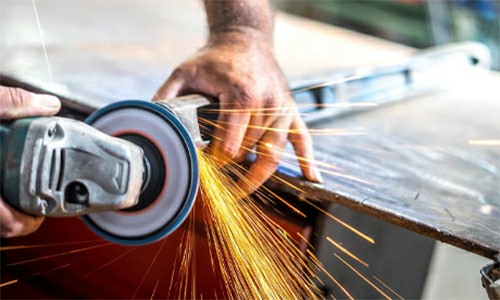


 349,500 Offered Certificates
349,500 Offered Certificates
 24/7 Online Training
24/7 Online Training
 Money Back Guarantee
Money Back Guarantee
 Fully Accredited Courses
Fully Accredited Courses

Created at: 22-02-2025 23:45
Abrasive wheels are crucial tools utilized in various industries, including construction, automotive, and manufacturing. Understanding the different types of abrasive wheels, their specific applications, and associated hazards is vital for ensuring workplace safety. In this guide, we will explore abrasive wheels, the potential risks involved, and the importance of proper training and certification to prevent accidents.
Abrasive wheels come in various types, each tailored for specific tasks. Here’s a detailed look at the primary categories:
Used primarily for metalworking, grinding wheels remove material from the surface of a workpiece to achieve a smooth finish.
Ideal for slicing through various materials, cutting wheels are commonly used in construction and manufacturing applications.
These wheels are designed for polishing surfaces to achieve a high-gloss finish. They are widely used in automotive detailing and metal finishing.
Abrasive wheels are essential in several industries. Here are some notable applications by sectors within Ireland:
Cutting and grinding wheels are frequently employed for cutting concrete, stone, and metal in construction sites across Dublin, Cork, and Galway.
Grinding and polishing wheels are utilized for everything from bodywork repairs to engine refinishing, ensuring vehicles are safely maintained in Limerick and Waterford.
Abrasive wheels are integral in the mass production of goods, helping to shape and finish products in factories throughout Ireland.
While abrasive wheels are extremely useful, they come with potential risks:
Improper handling or defective wheels can lead to sudden breakage, causing flying debris and potential injuries.
Excessive friction can result in overheating, leading to wheel degradation or even combustion in extreme cases.
Incorrectly mounted wheels can become loose during operation, increasing the risk of accidents.
To mitigate the risks associated with abrasive wheels, proper training is crucial. Here are key aspects of effective training:
Training should cover the different types of abrasive wheels and their specific applications.
Participants must learn safety guidelines, including proper handling, equipment checks, and emergency procedures.
Familiarity with Irish safety regulations is essential for workplace compliance and employee safety.
Certifying employees through dedicated abrasive wheels training programs is vital. Organizations can access various training options across major cities:
Abrasive Wheels Training in Dublin
Abrasive Wheels Certification in Galway
Abrasive Wheels Course in Cork
Abrasive Wheels Safety Course in Limerick
Abrasive Wheels Certification in Waterford
In conclusion, understanding the types of abrasive wheels and their applications is paramount for safety in various industries across Ireland. By investing in certified abrasive wheels training, businesses can ensure compliance with safety regulations and create a safer work environment. For those interested, consider enrolling in our Abrasive Wheels Course to enhance workplace safety.
For inquiries, contact us at [email protected].